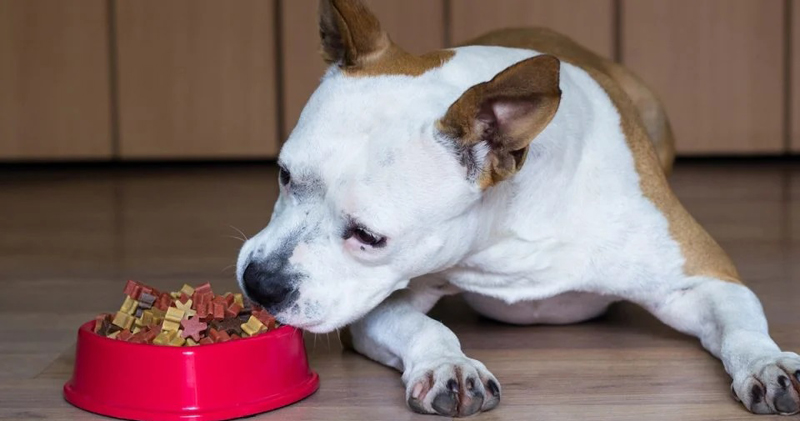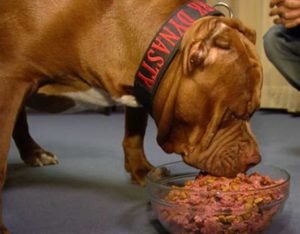Did you know that pitbulls have a unique dietary requirement? Unlike other dog breeds, pitbulls have a higher muscle mass and energy level, which means their food needs to be carefully balanced to meet their specific nutritional needs. So, what should a pitbull eat to maintain their health and vitality?
When it comes to feeding a pitbull, a high-quality, balanced diet is essential. These dogs require a combination of protein, carbohydrates, healthy fats, and essential vitamins and minerals to thrive. Opt for a dog food that is specifically formulated for pitbulls or large breeds, ensuring it contains real meat as the first ingredient. Additionally, providing a variety of fresh vegetables, fruits, and occasional treats can contribute to their overall wellbeing. It’s important to consult with a veterinarian to determine the appropriate portion sizes and feeding schedule based on your pitbull’s age, size, and activity level.
Overall, understanding a pitbull’s dietary needs is crucial for their overall health and well-being. These energetic dogs require a nutrient-rich diet that supports their muscles, joints, and overall growth. In fact, studies show that a well-balanced diet can help prevent health issues like obesity and hip dysplasia, which are common in pitbulls. By providing high-quality food, portion control, and regular veterinary check-ups, you can ensure that your pitbull stays happy, healthy, and full of energy.
Pitbulls should eat a balanced and nutritious diet to ensure their overall health and well-being. A proper diet for a Pitbull should consist of high-quality commercial dog food that is rich in protein and contains essential nutrients such as carbohydrates, fats, vitamins, and minerals. Additionally, incorporating fresh fruits and vegetables, lean meats, and occasional treats can provide variety and additional benefits. It’s important to consult with a veterinarian to determine the specific dietary needs of your Pitbull based on their age, weight, and activity level.

What Should a Pitbull Eat?
When it comes to the diet of your beloved Pitbull, it’s important to provide them with the right nutrition to keep them healthy and thriving. As a responsible dog owner, you want to ensure that your furry friend is getting all the necessary nutrients they need. In this article, we will explore the ideal diet for Pitbulls, including their nutritional needs, recommended food choices, and tips for feeding them.
The Nutritional Needs of Pitbulls
Pitbulls are active and muscular dogs, which means they require a well-balanced diet to support their energy levels and maintain their lean physique. The main macronutrients that should be included in a Pitbull’s diet are proteins, fats, and carbohydrates. Proteins serve as the building blocks for their muscles, fats provide them with energy, and carbohydrates supply them with quick-burning fuel. In addition to the macronutrients, Pitbulls also need essential vitamins, minerals, and water to complete their nutritional needs.
It’s recommended that Pitbulls consume a diet consisting of 30% lean protein, 20% healthy fats, and 50% carbohydrates. This can be achieved by feeding them a combination of high-quality commercial dog food and fresh, whole foods. Look for dog food brands that prioritize real meat as the first ingredient and avoid those that contain fillers, by-products, or excessive amounts of grains. It’s also a good idea to consult with your veterinarian to determine the specific nutritional needs of your individual Pitbull, as they may vary depending on factors such as age, weight, and activity level.
The Ideal Food Choices for Pitbulls
When it comes to choosing the right food for your Pitbull, it’s important to opt for high-quality options that meet their nutritional requirements. Here are some ideal food choices for Pitbulls:
- Lean Proteins: Include sources like chicken, beef, turkey, fish, and eggs. These provide essential amino acids for muscle growth and repair.
- Healthy Fats: Opt for fats from sources like salmon, flaxseed oil, and olive oil. These provide omega-3 and omega-6 fatty acids for a healthy coat and skin.
- Complex Carbohydrates: Choose sources like sweet potatoes, brown rice, and oats. These provide sustained energy and essential fiber.
- Fruits and Vegetables: Include a variety of fruits and vegetables like blueberries, spinach, carrots, and apples. These provide vitamins and minerals.
It’s important to note that while Pitbulls can eat some human foods, there are certain foods that should be avoided as they can be toxic to dogs. These include chocolate, grapes, onions, garlic, and avocados. Always consult with your veterinarian if you’re unsure about a specific food’s safety for your Pitbull.
Tips for Feeding Pitbulls
Feeding your Pitbull is not just about providing them with the right food but also establishing a proper feeding routine. Here are some tips for feeding Pitbulls:
- Divide their meals: Instead of feeding your Pitbull one large meal, split their daily food intake into two or three smaller meals to aid digestion.
- Measure their portions: Use a measuring cup or scale to ensure you’re giving your Pitbull the right amount of food according to their size and activity level.
- Avoid overfeeding: Pitbulls have a tendency to overeat, so it’s important to stick to the recommended portion sizes and avoid excessive treats.
- Provide fresh water: Always have fresh water available for your Pitbull to drink, especially during and after meals.
- Monitor their weight: Keep an eye on your Pitbull’s weight to ensure they’re maintaining a healthy body condition. Adjust their food portions accordingly if needed.
Common Pitbull Dietary Concerns
While Pitbulls typically have healthy appetites and robust digestive systems, there are a few dietary concerns that owners should be aware of:
Gastric Dilatation-Volvulus (GDV):
Pitbulls, like many deep-chested breeds, are at a higher risk for GDV, also known as bloat. This is a life-threatening condition in which the stomach fills with gas and twists. To help prevent bloat, avoid feeding your Pitbull too quickly, provide smaller meals throughout the day, and avoid exercise immediately before or after meals.
Allergies and Food Sensitivities:
Some Pitbulls may develop allergies or sensitivities to certain ingredients in their food. Common allergens include wheat, soy, corn, and beef. If you notice signs of allergies such as itching, ear infections, or digestive issues, consult with your veterinarian to determine the best dietary approach for your Pitbull.
Obesity:
Pitbulls are prone to weight gain, so it’s important to monitor their calorie intake and ensure they are getting enough exercise. Obesity can lead to various health problems and reduce your Pitbull’s quality of life. Regular exercise and portion control are key to maintaining a healthy weight for your Pitbull.
Conclusion
Proper nutrition plays a vital role in the overall health and well-being of your Pitbull. By understanding their nutritional needs, choosing the right food options, and following a consistent feeding routine, you can ensure that your Pitbull stays healthy, happy, and full of energy. Remember to consult with your veterinarian for personalized advice and recommendations based on your Pitbull’s specific needs. With the right diet and care, your Pitbull can enjoy a long and vibrant life by your side.
Key Takeaways: What Should a Pitbull Eat?
- Pitbulls should eat a balanced and nutritious diet that includes high-quality protein sources like chicken, beef, or fish.
- Fruits and vegetables should also be included in their diet to provide essential vitamins and minerals.
- Avoid feeding them table scraps and foods that are toxic to dogs, such as chocolate, onions, and grapes.
- Consult with your veterinarian to determine the right portion sizes for your pitbull based on their age, size, and activity level.
- Consider feeding them dry kibble or wet food specifically formulated for pitbulls to ensure they receive the necessary nutrients.
Frequently Asked Questions
Welcome to our frequently asked questions about what a pitbull should eat. Here, we’ll address some common inquiries to help you understand the dietary needs of your beloved pitbull.
1. How often should I feed my pitbull?
It’s best to feed your pitbull two meals a day, dividing their daily portion between them. This will help maintain a balanced diet and prevent overeating. Keep in mind that individual pitbulls may have unique dietary requirements, so consult your veterinarian for personalized recommendations.
Be mindful of leaving food out all day long, as free-feeding can lead to obesity and other health issues. A regular feeding schedule not only helps with portion control but also establishes a routine that your pitbull can rely on.
2. What should I include in my pitbull’s diet?
A well-balanced diet for a pitbull should include high-quality dog food that is specifically formulated for their breed or size. Look for dog foods that list real meat as the primary ingredient, avoiding fillers and artificial additives.
In addition to dog food, you can supplement your pitbull’s diet with fresh fruits and vegetables like carrots, blueberries, and sweet potatoes. These nutrient-rich foods can provide additional vitamins and fiber. However, avoid feeding your pitbull toxic foods like grapes, raisins, chocolate, or anything containing caffeine.
3. Can I give my pitbull bones to chew on?
It’s best to avoid giving your pitbull bones to chew on. While they may seem like a natural choice for dogs, bones can pose various risks, especially cooked bones that can splinter and cause serious injuries to the digestive tract. Splintered bones can lead to choking, blockages, or punctures.
Instead, offer safe alternatives like specially designed chew toys, dental chews, or rawhide-free treats. These options provide mental stimulation, promote healthy teeth and gums, and eliminate the dangers associated with bones.
4. How much water should my pitbull drink?
Water is essential for your pitbull’s overall health and well-being. As a general guideline, provide your pitbull with fresh, clean water at all times and make sure to refill their bowl regularly.
Pitbulls can vary in their water intake based on their size, activity level, and environmental factors. It’s crucial to monitor their water consumption and consult your veterinarian if you notice any significant changes, such as excessive drinking or dehydration.
5. Are there any foods that my pitbull should avoid?
Yes, there are several foods that can be harmful to pitbulls and should be avoided. Some common examples include chocolate, caffeinated beverages, onions, garlic, grapes, raisins, macadamia nuts, and alcohol. These foods can be toxic to dogs and may lead to serious health issues.
Additionally, some pitbulls may have specific food allergies or sensitivities, so it’s important to watch for any adverse reactions, such as gastrointestinal upset or skin problems, when introducing new foods into their diet. If you suspect your pitbull has food sensitivities, consult your veterinarian for guidance on an appropriate elimination diet.

Raw Food vs Kibble: What should you feed your pit bull?
Summary
So, what should a pitbull eat? Pitbulls need a balanced diet of protein, carbohydrates, and fats. It’s important to choose high-quality dog food that meets their nutritional needs. Avoid feeding them human food or anything toxic to dogs. Remember to offer fresh water and treats in moderation. Regular exercise and regular vet check-ups are also crucial for their overall health and well-being. Take good care of your pitbull and they will be happy and healthy companions for life.
